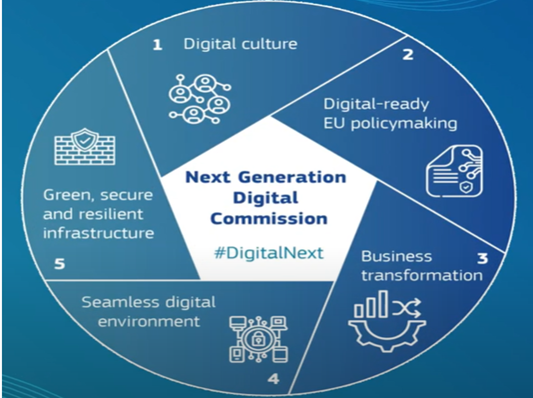The digital strategy defines a new vision and possibilities for digital transformation after the pandemic period and supports the implementation of the EU’s strategic priorities until 2030. The strategy outlines the framework of digital transformation and emphasizes cooperation, connecting people, data, processes and technology.
In the last two years, during the so-called “Covid”, the digital transformation of the Commission has also accelerated, with a digital strategy outlining ambitious goals, accelerated digital transformation and emphasizing support for the EU’s strategic priorities until 2030.
The direction of the European digital transformation is led by:
– from information technology to digital transformation,
– from digital skills to digital culture and
– from technology as a service provider to digitization and digital-ready policymaking.
The five key objectives of the next generation digital strategy are:

Foster a digital culture that puts users at the center and enables design, collaboration, digital fluency, agility and technical expertise.
Enable digital EU policy-making that will guide and include digital thinking already at the early stages of the legislative process.
Promote the digital transformation of companies to optimize existing and new business and administrative processes using the latest technological developments in artificial intelligence (analytics and big data), mobility, cloud computing, etc.
To provide a seamless digital space to modernize digital solutions so that they become more user-friendly, interoperable and secure.
Maintain a green, secure and resilient infrastructure to deliver services that meet growing business needs and maintain a secure and green infrastructure that supports flexible ways of working.
The principles of digital transformation are based on common European values:
Digital partnerships – Promoting cooperation between internal departments, other EU institutions and stakeholders.
Digital interaction first – communication through digital means will be encouraged and supported, while ensuring full accessibility.
Digital empowerment – Providing the necessary tools, services, skills for staff, providing “digital thinking” and space to use digital technologies for innovation.
Digital sovereignty and autonomy – Exploring technical alternatives that positively promote the Commission’s ability to operate in a cost-effective, sustainable, independent and secure manner.
Digital security and resilience – Ensuring adequate protection of the Commission’s digital assets and supporting rapid incident recovery.
You can read about the strategy here or watch a short video about it.

0 Comments